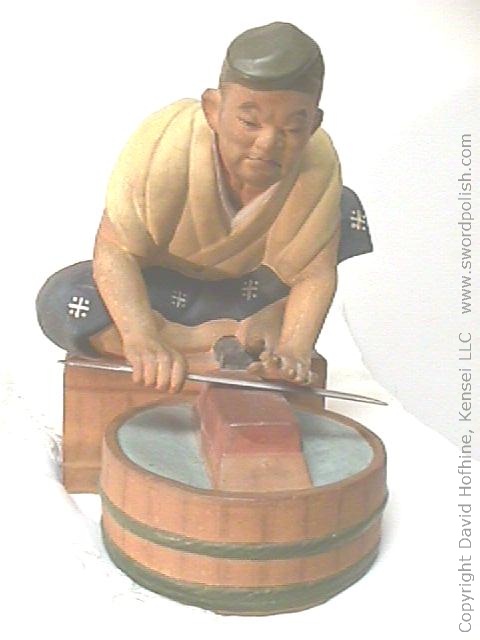| | This
is an excerpt from the epic novel Musashi written
by
Eiji Yoshikawa in 1929. The novel depicts the life and times of the
famous samurai, Miyamoto Musashi, during the early Edo period. It
includes some of the interaction between Musashi and the sword polisher
Kosuke regarding the care and condition of Japanese swords. It is
interesting because it was written in 1929 well before the second world
war and it reflects the concern for the care of Japanese swords in
Japan
both at that time and during the Edo period. It reminds me of the way
many swords have been poorly cared for in the US over the past half
century and proves this is not a uniquely American short coming.
"That's
interesting. I happen to have made the acquaintance of your
master and his excellent mother, Myoshu." Musashi went on to tell how
he had met them in the field near the Rendaiji and later spent a few
days at their house.
Kosuke, astonished, scrutinized
him closely for a moment. "Are you
by any chance the man who caused a great stir in Kyoto some years ago
by defeating the Yoshioka School at Ichijoji? Miyamoto Musashi was the
name, I believe."
"That is my name." Musashi's
face reddened slightly.
Kosuke moved back a bit and
bowed deferentially, saying, "Forgive
me. I shouldn't have been lecturing you. I had no idea I was talking to
the famous Miyamoto Musashi."
"Don't give it a second
thought. Your words were very instructive.
Koetsu's character comes through in the lessons he teaches his
disciples."
"As I'm sure you know, the
Hon'ami family served the Ashikaga
shoguns. From time to time they've also been called upon to polish the
Emperor's swords. Koetsu was always saying that Japanese swords were
created not to kill or injure people but to maintain the imperial rule
and protect the nation, to subdue devils and drive out evil. The sword
is the samurai's soul; he carries it for no other purpose than to
maintain his own integrity. It is an ever-present admonition to the man
who rules over other men and seeks in doing so to follow the Way of
Life."
The Polisher Kosuke goes on to describe the sad state of
disregard
of many swords even during the height of the samurai era and provides
some interesting insight into the preservation of swords...
"At Suwa Shrine in Shinano
Province there are more than three
hundred swords. They could be classed as heirlooms, but I found only
five that weren't rusted. Omishima Shrine in lyo is famous for its
collection, three thousand swords dating back many centuries. But after
spending a whole month there, I found only ten that were in good
condition. It's disgusting!" Kosuke caught his breath and continued.
"The problem seems to be that the older and more famous the sword is,
the more the owner is inclined to make sure it's stored in a safe
place. But then nobody can get at it to take care of it, and the blade
gets rustier and rustier."
"The owners are like parents
who protect their children so
jealously that the children grow up to be fools. In the case of
children, more are being born all the time, doesn't make any difference
if a few are stupid. But swords . . ." Pausing to suck in the spit, he
raised his thin shoulders even higher and with a gleam in his eyes
declared, "We already have all the good swords there'll ever be. During
the civil wars, the swordsmiths got careless, no, downright sloppy!
They forgot their techniques, and swords have been deteriorating ever
since."
"The craftsmen today may try to
imitate the older swords, but
they'll never turn out anything as good. The only thing to do is to
take better care of the swords from the earlier periods."
|
